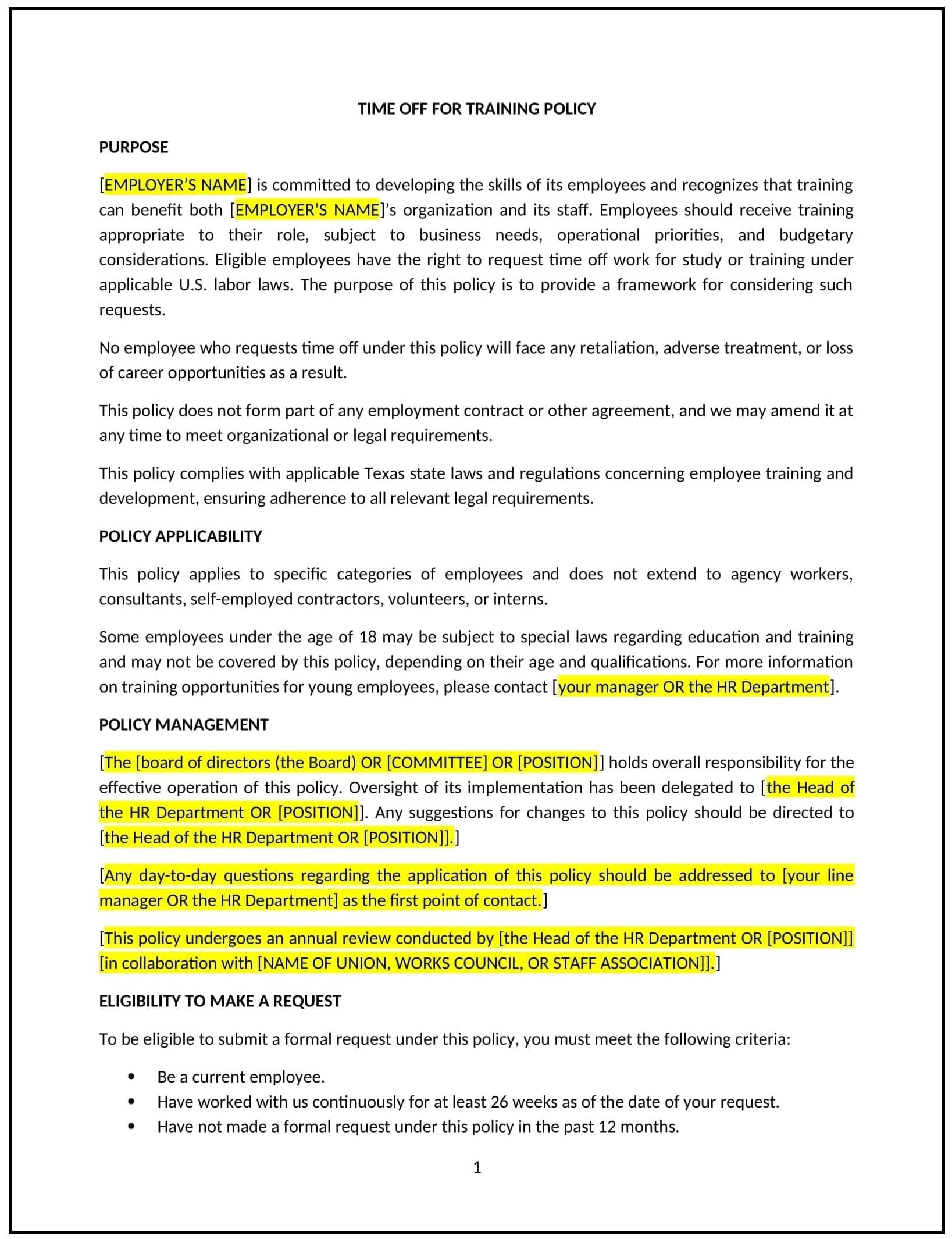Time off for training policy (Texas): Free template
Got contracts to review? While you're here for policies, let Cobrief make contract review effortless—start your free review now.

Customize this template for free
Time off for training policy (Texas)
This time off for training policy is designed to help Texas businesses provide clear guidelines for employees who need time off to attend training programs, workshops, or professional development courses. The policy outlines the process for requesting time off, the approval procedure, and how the company supports employees in enhancing their skills while balancing business needs.
By adopting this policy, businesses can invest in employee development, improve job performance, and ensure that employees gain the skills needed to contribute to the company's success.
How to use this time off for training policy (Texas)
- Define eligible training activities: Clearly define what types of training activities qualify for time off, such as courses, certifications, workshops, seminars, and other professional development opportunities that directly benefit the employee’s role and the business.
- Set approval procedures: Outline the process for requesting time off for training, including the advance notice required, any documentation that employees need to submit (e.g., course registration), and how employees will be notified about the approval status of their request.
- Specify paid vs. unpaid leave: Clarify whether time off for training is paid or unpaid, and whether the company will cover training costs, such as registration fees, travel expenses, or materials. If paid, specify the compensation structure.
- Determine time-off limits: Establish guidelines for how much time off employees are allowed for training, and whether there are any limits on the number of days that can be taken annually or per training event.
- Address training outside of work hours: Specify whether training that takes place outside of regular working hours, such as evening or weekend classes, will count toward paid or unpaid leave.
- Set expectations for job performance: Ensure that employees understand that time off for training should not disrupt their job responsibilities. Employees should be expected to maintain productivity and meet performance standards during and after the training period.
- Address job protection: Ensure that employees who take time off for training will not be penalized or discriminated against for taking time away from work. Employees should have job protection and be allowed to return to their regular positions after completing training.
- Monitor the effectiveness of training: Include provisions for assessing the effectiveness of the training and how it will benefit the company. Employees may be required to report back on their training experience and share any new skills or knowledge they have gained.
Benefits of using this time off for training policy (Texas)
This policy offers several benefits for Texas businesses:
- Promotes employee development: By offering time off for training, businesses invest in employees’ growth, improving their skills and enhancing their job performance.
- Increases productivity: Well-trained employees are more efficient and effective in their roles, which can lead to improved productivity and a higher-quality output.
- Enhances employee satisfaction: Providing opportunities for professional development helps employees feel valued and supported in their career growth, increasing job satisfaction and retention.
- Supports company success: Employees who undergo training are better equipped to contribute to the company’s success by acquiring new skills and knowledge that benefit the business.
- Strengthens compliance: Ensuring employees are properly trained in relevant regulations, safety practices, and industry standards helps businesses stay compliant with Texas state laws, federal regulations, and industry requirements.
- Attracts talent: Offering time off for training and development can enhance the company’s reputation, making it an attractive employer for top talent seeking opportunities for career advancement.
Tips for using this time off for training policy (Texas)
- Communicate the policy clearly: Ensure that all employees are aware of the time off for training policy, including the approval process, compensation details, and the types of training covered.
- Monitor training requests: Track and manage training requests to ensure that the company can accommodate all employees while maintaining business operations.
- Provide feedback on training effectiveness: Regularly assess the effectiveness of training and development programs to ensure that they align with the company’s goals and meet employees' needs.
- Encourage continuous learning: Foster a culture of learning and development by encouraging employees to seek out training opportunities that will enhance their skills and contribute to the company’s success.
- Ensure fairness: Apply the policy consistently across all employees to ensure fairness in granting time off for training, particularly when managing competing requests for time away from work.
- Review regularly: Periodically review the policy to ensure it remains in line with Texas state laws, federal regulations, and business needs.